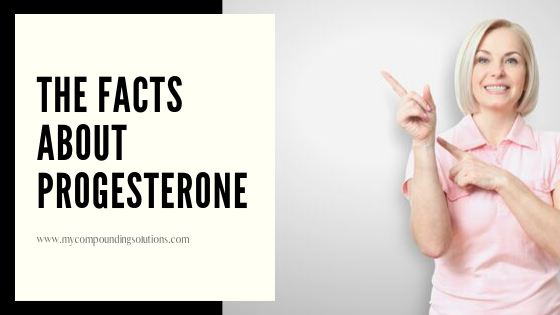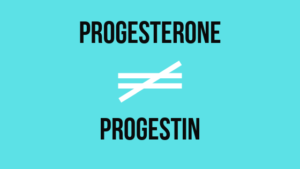
Today we’re talking about Progesterone – one of the most misunderstood topics when it comes to women’s health.
What is Progesterone?
Let’s start with a short lesson about a woman’s menstrual cycle. In the first half of your cycle (approximately 14 days), Estrogen is working to grow the cells of the uterus to prepare for the fertilization of an egg. When ovulation occurs, Estrogen production slows and Progesterone steps up. Progesterone slows down the growth of endometrial cells and develops the function of those cells. If you become pregnant, Progesterone continues to rise. If you do not, Progesterone levels drop back down and the whole cycle starts again.
Progesterone receptors are located throughout a woman’s body – all the female organs, the liver, breast tissue, blood vessels, bone and brain. Progesterone is busy! But when your ovaries slow down, so does Progesterone production. If you are in perimenopause, Progesterone slows but Estrogen may not creating a situation we call Estrogen Dominance. This lack of Progesterone to balance Estrogen can cause many symptoms such as anxiety, sleep issues, weight gain, hair loss, low libido and more!
Are Progestins and Progesterone the same?
This is where the confusion really comes in…Progestin and Progesterone sound a lot alike but they are not the same! In the beginning, progesterone was not available in a form that could be well absorbed, so pharmaceutical manufacturers created a synthetic progestin called Medroxyprogesterone acetate. These are more powerful than what your body makes and again, they are synthetic. They are not the same as what your body produces and can in fact interfere with your body’s own natural progesterone causing more problems!
Thankfully, Progesterone is now available in a micronized form that is better absorbed. This allows women to receive bio-identical progesterone instead of a synthetic progestin as part of their hormone therapy. While both progesterone and synthetic progestins protect the endometrium, there are significant differences in their effect on breast tissue: progesterone induces death of breast cancer cells while progestins may significantly increase estrogen-stimulated breast cell proliferation, which can contribute to the development of breast cancer. Bio-identical progesterone is identical to what your body makes, it is not a synthetic.

Does Progesterone cause breast cancer?
In a study of over 80,000 postmenopausal women, the following breast cancer risk was observed:
- Women who used estrogen only were found to have a 29% increased risk of breast cancer compared to women who had never used Hormone Replacement Therapy (HRT)
- Women who used estrogen plus a synthetic progestin were found to have a 69% increased risk of breast cancer compared to women who had never used HRT
- Women who used estrogen plus progesterone were found to have no increased risk for breast cancer
“These findings suggest that the choice of the progestagen component in combined HRT is of importance regarding breast cancer risk; it could be preferable to use progesterone.” (Progestagen – also spelled progestogen – is the class of hormones that includes progesterone and progestins.)
Breast Cancer Res Treat. 2008; 107(1):103-111.
A study of the influence of topically administered estradiol and progesterone on human breast tissue concluded that progesterone administration decreases estrogen-induced breast cell proliferation by 400%.
Fertil Steril. 1995;63(4): 785-791.
How do I know if my Progesterone is low?
We recommend a saliva test to determine your Progesterone (and other sex hormone) levels. We offer them at our pharmacy. Just stop by and we’ll give you instructions – then take it home, complete the test and mail it to the lab. The results come back to us in about 2 weeks. You can also ask your provider to order labs. I offer consultations where we review your medical history, symptoms, labs and health goals and work together to determine a plan to help you achieve better hormonal health.
What can I do if I have low Progesterone?
We offer over the counter Progesterone cream and we can also compound bio-identical Progesterone cream, capsules and sublingual troches to meet your individual needs with a prescription from your provider. We also have an array of nutritional supplements which can help your body support it’s own Progesterone production.
We’re happy to help you on your journey to better hormonal health. Call or stop by today to learn more about how we can help you.

![]()
If you enjoyed this post, you may also enjoy: